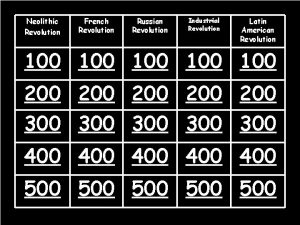Women and the French Revolution The French Revolution

















- Slides: 17

Women and the French Revolution

The French Revolution and the Political Aspirations of Women The Enlightenment, as a social and intellectual movement, impacted many segments of society, including women in the elite and common classes during the revolutions of the 18 th and 19 th centuries.

• Wealthy French women participated in the Enlightenment movement by making their homes centers of debate, intellectual speculation and free inquiry. • Women were powerfully affected by their participation in revolutionary politics, which in part resulted from Enlightenment thinking. A Reading in the Salon of Madame Geoffrin, 1755

Women as a public revolutionary force • Women were a public revolutionary force in the first months of 1789, although they could not vote nor seek seats in the National Assembly. • Women participated in the attack on the Bastille and street demonstrations. • Their most impressive demonstration of numbers was the 7, 000 women seeking cheaper bread who walked to Versailles in October 1789 and forced the king and the National Assembly to return to Paris.

The Women’s March • European women had a long tradition of rioting when they suspected speculators of hoarding food to drive up prices. Authorities seldom arrested the women rioters. • Frenchwomen’s food riots, called taxation populaire, typically involved crowds seizing merchandise from shopkeepers and grocers, distributing it equally to the crowd at what they determined was a just price, and then returning proceeds to the merchants.

A symbol of the power of the Revolution • Women’s success in organizing demonstrations against high food prices gained them political influence. • Eventually, the new French Republic was personified as a woman, “Marianne” – an allegory of liberty and reason.

Women’s political clubs • The most significant female participation in the French Revolution came with the advent of the women’s political club. • Political clubs provided members with intellectual stimulation and a way to exert political pressure on the National Assembly, but none admitted women until January 1790, when Le Confederation des amis de la verité (The Confederation of the Friends of the Truth) was founded. The Women’s Patriotic Club

The disenfranchisement of women Declaration of Rights of Man and Citizen Niquet the Younger (1789)

Female Citizens? “It is altogether astonishing that, having gone so far along the path of reforms, and having cut down. . . a large part of the forest of prejudices, you would leave standing the oldest and most general of abuses, the one which excludes the most beautiful and lovable half of the inhabitants of this vast kingdom from positions, dignities, honors, and especially from the right to sit amongst you. ” From the Women's Petition to the National Assembly, October 1789

• The failure of the Declaration of the Rights of Men and Citizens to include women was intentional and not a sentiment shared by all. • The Marquis de Condorcet published in 1790 the essay “On Giving Women the Right of Citizenship”: – Responded to every objection posed to women’s political equality including: pregnancy, lack of educational brilliance, emotionalism, dependence on husbands, and the social problem society would face if women abandoned their domestic responsibilities to rule – Logical and systematic response in the spirit of the Enlightenment

A Declaration of Rights of Woman • Olympe de Gouges, a French playwright and political activist, wrote her famous Declaration shortly after the passing of the French constitution of 1791. • She challenged the practice of male authority and the notion of male-female inequality. “Woman has the right to mount the scaffold; she must equally have the right to mount the rostrum. ” - Article X, Declaration of Rights of Woman and Citizenness

The disenfranchisement of Women (Continued) • As the political institutions in revolutionary France came more under the control of the popular classes, women were able to increase their political power – although their influence was at first exercised through male relatives. • Middle-class radicals pressured authorities for legislation to remove inequalities in women’s lives. • The persuasion of the radicals and the power of women were temporarily successful in enacting reform legislation until 1793; the summer of this year being the high point in women’s political influence in France. • By the fall of 1793, the revolutionary government, under the pressure of civil war and rural reaction against restrictions imposed on the Catholic Church, began a retreat that eventually eliminated women’s participation in politics.

From protectors of the Republic to personification of extreme violence A revolutionary heroine defends her home, her family, and her political allegiance A terrible mother who recklessly fires a gun near her children

• During the Reign of Terror, women activists were arrested. • The Jacobins outlawed their clubs, believing that women belonged in the private sphere of the home, not in the public sphere of men. • Among the many who lost their heads to the guillotine was Olympe de Gouges, accused of “attacking the sovereignty of the French people. ”

Subordinating women for the sake of political stability • By 1804, women were as powerless and submissive as they had been before they marched to Versailles in 1789. • The instrument that marked their fall was the Napoleonic Code of 1804.

A conservative reaction against revolution • The Napoleonic Code symbolized for women the conservative reaction against revolution. • Under the Code: - married women returned to the status of permanent legal dependents of men - women acquired the nationality of their husbands upon marriage - women could not participate in lawsuits or serve as witnesses in court - men were no longer responsible for the support of illegitimate children - female adultery was punished by imprisonment (men did not suffer such sanctions!) - the space women could occupy in the new regime was defined as marital, maternal, and domestic - women did not have control over property, and their wages went to their husbands

Women and the Revolution • The Enlightenment impacted women of both the elite and the poorer classes. • Women of the elite participated in the debates and dissemination of Enlightenment thought, whereas poor women took Enlightenment inspiration to organize protests and boycotts. • Unfortunately, their interest and participation were not recognized by the new French government in the aftermath of the revolution. Both elite and common women remained disenfranchised until the twentieth century. • Although neither in law nor practice did women achieve real equality during the Revolution, their participation was of great symbolic importance in underscoring the universal claims of revolutionaries.
 Sansculottes
Sansculottes Russian revolution vs french revolution
Russian revolution vs french revolution How could the french revolution have been avoided
How could the french revolution have been avoided Causes and effects of the french revolution
Causes and effects of the french revolution Causes and effects of the french revolution
Causes and effects of the french revolution French revolution
French revolution French revolution causes and effects
French revolution causes and effects French revolution causes and effects
French revolution causes and effects Enlightenment and french revolution
Enlightenment and french revolution What was the social cause of french revolution
What was the social cause of french revolution Chapter 11 the french revolution and napoleon
Chapter 11 the french revolution and napoleon Chapter 23 the french revolution and napoleon
Chapter 23 the french revolution and napoleon Jack and jill french revolution
Jack and jill french revolution The french revolution and napoleon section 3 quiz
The french revolution and napoleon section 3 quiz Chapter 11 the french revolution and napoleon
Chapter 11 the french revolution and napoleon Third agricultural revolution definition
Third agricultural revolution definition Grindstone french revolution
Grindstone french revolution The french revolution timeline
The french revolution timeline
































